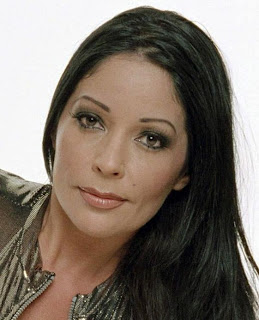Prince: The Man, The Music, The Makeup
Apollonia starred as Prince's love interest in "Purple Rain" and epitomized his vision of beauty.
Anyone born before 1980 probably remembers Prince at the height of his career: Twenty seven years ago, in 1984, he released Purple Rain, an album which far eclipsed its movie version and still rightly tops many Best Albums of All Time lists. The music and videos were as much a visual feast as they were a study in musical genius: Prince broke all the rules back then. To this day, his music and the looks he championed push cultural comfort zones.
At the time of the album's release, I was still forming opinions about my looks, which were morphing constantly under growth spurts and impending puberty.: Images of Christie Brinkley were everywhere. Makeup contracts weren't yet signing models of color; it was considered an event when a magazine put one on its cover.
Prince's vision of beauty was the opposite of its time: The women in his videos and movie were all dark-skinned, dark-haired exotic beauties. Their ethnicities were something you couldn't quite put your finger on. There was something controversial about Prince's virtual harem of women (he'd take them under his wing, give them a stage name, and essentially become their Svengali): Vanity, Apollonia, Sheila E, Sheena Easton, and even Carmen Electra all had their images built under his influence. He even did a song Cindy C., dedicated to supermodel Cindy Crawford. She once said she understood that song wasn't about her, but about what he saw when he looked at her pictures.
Prince's music is still seared in my collective 80s memory. As time has gone on and no one has come along to duplicate him, I appreciate him more and more. Brilliance often teeters close to the edge of insanity: When he renamed himself as an unpronounceable symbol, people were officially diagnosing him with stuff (it was later revealed to be a protest of the practices of music labels). Aside from his musical talent, I appreciate that he went against the grain in his idea of beauty and pushed an image that pop culture wasn't promoting at the time. No, it's not the only standard of beauty, but it's another standard of beauty and helped one little girl know that it was out there.
As an artist, sometimes your purpose is to afflict the comfortable and comfort the afflicted. Prince did both in a way that was both brilliant and enduring.
Anyone born before 1980 probably remembers Prince at the height of his career: Twenty seven years ago, in 1984, he released Purple Rain, an album which far eclipsed its movie version and still rightly tops many Best Albums of All Time lists. The music and videos were as much a visual feast as they were a study in musical genius: Prince broke all the rules back then. To this day, his music and the looks he championed push cultural comfort zones.
At the time of the album's release, I was still forming opinions about my looks, which were morphing constantly under growth spurts and impending puberty.: Images of Christie Brinkley were everywhere. Makeup contracts weren't yet signing models of color; it was considered an event when a magazine put one on its cover.
Prince's vision of beauty was the opposite of its time: The women in his videos and movie were all dark-skinned, dark-haired exotic beauties. Their ethnicities were something you couldn't quite put your finger on. There was something controversial about Prince's virtual harem of women (he'd take them under his wing, give them a stage name, and essentially become their Svengali): Vanity, Apollonia, Sheila E, Sheena Easton, and even Carmen Electra all had their images built under his influence. He even did a song Cindy C., dedicated to supermodel Cindy Crawford. She once said she understood that song wasn't about her, but about what he saw when he looked at her pictures.
Prince's music is still seared in my collective 80s memory. As time has gone on and no one has come along to duplicate him, I appreciate him more and more. Brilliance often teeters close to the edge of insanity: When he renamed himself as an unpronounceable symbol, people were officially diagnosing him with stuff (it was later revealed to be a protest of the practices of music labels). Aside from his musical talent, I appreciate that he went against the grain in his idea of beauty and pushed an image that pop culture wasn't promoting at the time. No, it's not the only standard of beauty, but it's another standard of beauty and helped one little girl know that it was out there.
As an artist, sometimes your purpose is to afflict the comfortable and comfort the afflicted. Prince did both in a way that was both brilliant and enduring.


Comments
Post a Comment